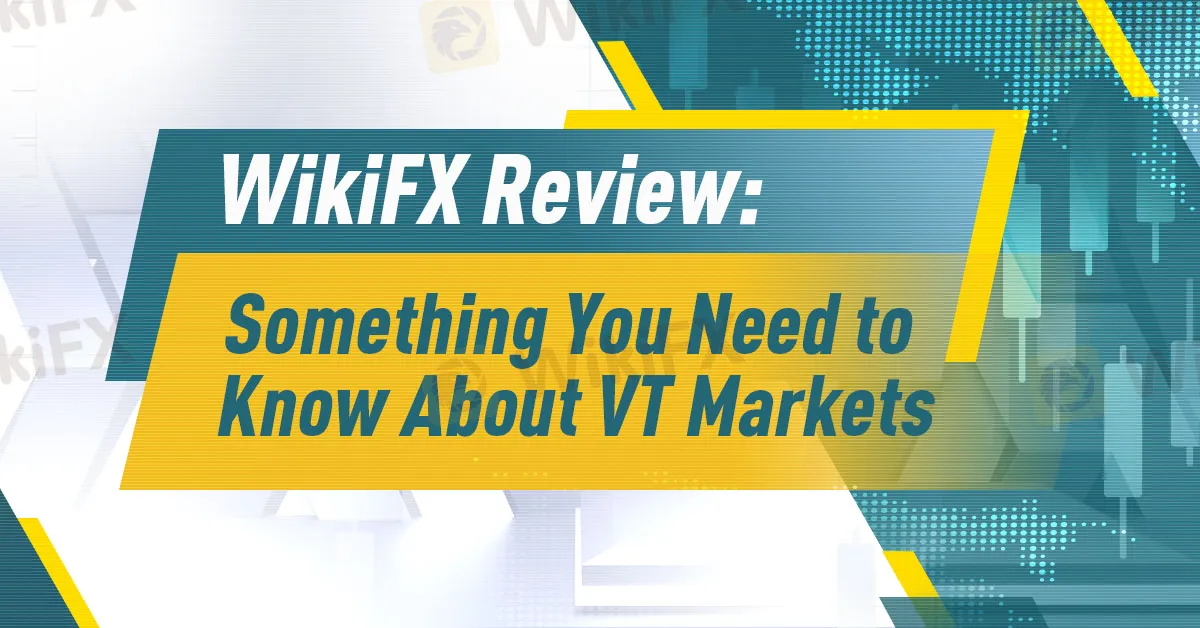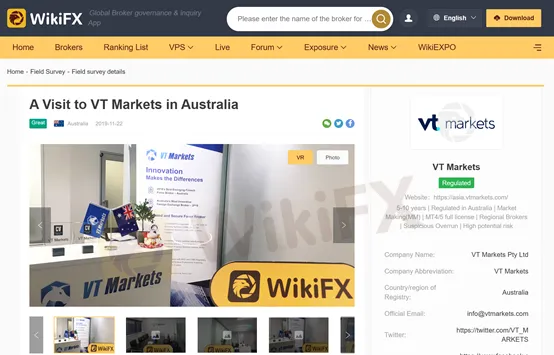简体中文
繁體中文
English
Pусский
日本語
ภาษาไทย
Tiếng Việt
Bahasa Indonesia
Español
हिन्दी
Filippiiniläinen
Français
Deutsch
Português
Türkçe
한국어
العربية
WikiFX Review: Something You Need to Know About VT Markets
Abstract:In this review article, we will delve into essential details about VT Markets, as assessed by WikiFX, a renowned broker review platform. WikiFX evaluates brokers based on several criteria, including regulatory status, account types, leverage, exposure, and field surveys.


About VT Markets
According to VT Markets, VT Markets was founded in 2016 and headquartered in Sydney, Australia, a subsidiary of Vantage International Group Limited, and has over ten years of experience and expertise in global financial markets. VT Markets offers a suite of trading instruments, including major, minor, and exotic currency pairs, allowing traders to capitalize on various market opportunities. In addition to forex, the broker also provides access to other financial instruments, including Soft Commodities, Indices, Cryptocurrencies, Energy, Share CFDs, Bonds CFDs, ETFs trading, and Precious Metals.
WikiFX Score: 7.35/10
WikiFX provides a comprehensive score to brokers, aiming to give traders a quick assessment of their overall performance. VT Markets receives a WikiFX score of 7.35 out of 10, indicating a reasonably good standing within the industry.
Regulatory Status
VT Markets operates under the oversight of the Financial Sector Conduct Authority (FSCA) with license number 50865. This regulatory status provides a layer of security for traders.
However, it's worth noting that VT Markets exceeds the business scope regulated by the Australia ASIC, where it holds license number 516246. This raises some concerns about the broker's compliance with certain regulations in Australia.

Account Types
VT Markets offers two main account types:
STP Account: This account type is suitable for traders looking for straightforward and competitive spreads, as it operates on a Straight Through Processing (STP) model.
RAW ECN Account: The RAW ECN account is designed for traders who require access to direct market liquidity and a deep pool of liquidity providers. It offers variable spreads and lower trading costs.
Spreads & Commissions
VT Markets offers different trading accounts with varying spreads and commission structures to cater to the diverse needs of traders.
The standard account at VT Markets provides a zero-commission trading environment, which means that you won't be charged any commissions on your trades. However, it offers average spreads on currency pairs. For example, the spreads on major pairs like EUR/USD start from 1.3 pips, GBP/USD from 1.8 pips, AUD/USD from 1.6 pips, and USD/JPY from 1.5 pips. While these spreads are competitive, they are slightly wider compared to ECN account spreads.
Non-Trading Fees
VT Markets prides itself on its transparent fee structure, and while the focus is primarily on competitive trading conditions, there are a few non-trading fees to be aware of. Let's explore these fees in more detail to gain a comprehensive understanding of the costs involved.
Leverage: 1:500
VT Markets provides a high leverage of 1:500, which can be attractive to traders seeking the potential for higher returns. However, it's essential to remember that higher leverage also involves higher risk, and traders should use it cautiously.
Trading Platforms
VT Markets offers a range of advanced trading platforms to cater to the diverse needs of traders. With their selection of robust platforms, including MetaTrader 4 (MT4), MetaTrader 5 (MT5), WebTrader, WebTrader+, and the VT Market App, traders can access the financial markets with ease and precision. Each platform provides unique features and capabilities to enhance trading experiences and execute trades efficiently.
Exposure
It's crucial to consider the reputation and track record of a broker before investing your hard-earned money. WikiFX has received 27 complaints against VT Markets within the past three months. While this is not an unusually high number, it does indicate that some traders have had issues with the broker. Potential investors should take these complaints into account when making their decision.

WikiFX's Field Survey on VT Markets
WikiFX conducts field surveys to gather on-the-ground information about brokers. In the case of VT Markets, WikiFX confirms that the broker does indeed exist, which is a positive sign of legitimacy.

Conclusion
In conclusion, VT Markets, as assessed by WikiFX, appears to be a reasonably reputable broker with a score of 7.35/10. It is regulated by the FSCA and operates in Australia, which adds a layer of credibility to its operations. However, it's important to note that the broker has exceeded the business scope regulated by Australia ASIC, which may raise concerns for some traders.
VT Markets offers two main account types, each catering to different trading preferences, and provides a high leverage of 1:500. However, it has received 27 complaints within the past three months, indicating that not all traders have had a positive experience.
Before deciding to invest with VT Markets or any broker, it's crucial to stay updated with the latest information on WikiFX and conduct your due diligence. Market conditions and broker reputations can change, so make sure to make informed decisions to avoid potential regrets in your trading journey.

Disclaimer:
The views in this article only represent the author's personal views, and do not constitute investment advice on this platform. This platform does not guarantee the accuracy, completeness and timeliness of the information in the article, and will not be liable for any loss caused by the use of or reliance on the information in the article.
Read more

The January Effect of 2025 in Forex Markets
Like other financial markets, the forex market is influenced by various factors, including economic data, geopolitical events, and market sentiment. However, one often overlooked factor is seasonality—patterns that recur at specific times of the year. One such seasonal phenomenon is the "January Effect," which can have a notable impact on currency trading.

OPEC's Profound Influence on the Oil Market
At present, oil prices remain relatively stable, but global economic recovery and shifting market demands continue to drive price fluctuations. Amid an uncertain global economic and geopolitical landscape, OPEC’s policies and actions remain key determinants of oil prices.

What Euro Investors Can't Afford to Miss
For euro investors, geopolitical factors, inflation data, and the European Central Bank's policy direction will determine the market trends over the next few months.

How Big is the Impact of the USD-JPY Rate Gap on the Yen?
The U.S. Federal Reserve's repeated rate cuts and the narrowing of the U.S.-Japan interest rate differential are now in sight. So, why is the U.S.-Japan interest rate differential so important for the yen’s safe-haven appeal, especially when global economic uncertainty rises?
WikiFX Broker
Latest News
Think Before You Click: Malaysian Loses RM240,000 to Investment Scam
What Are The Top 5 Cryptocurrency Predictions For 2025?
Lawsuit Filed Against PayPal Over Honey’s Affiliate Fraud
OPEC's Profound Influence on the Oil Market
Just2Trade: SAFE or SCAM?
The January Effect of 2025 in Forex Markets
New York becomes first US city with congestion charge
Currency Calculator






